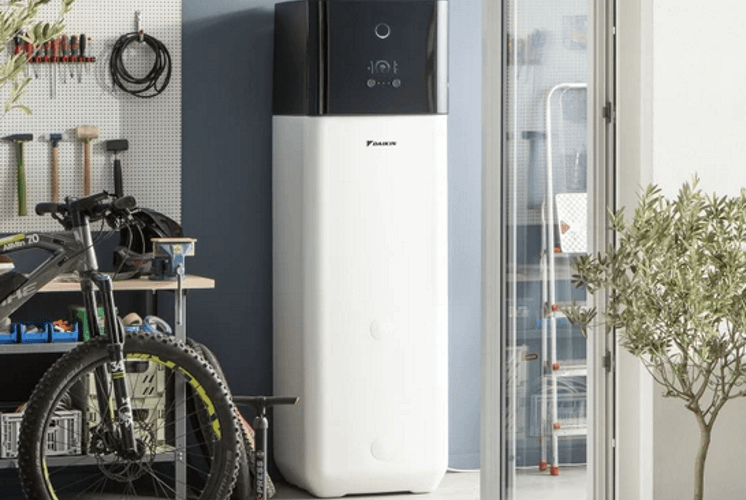With the UK falling far behind Europe in heat pump adoption, the country faces an uphill battle to meet its ambitious climate goals.
Despite growing interest from homeowners—nearly half (49%) of UK residents show interest in low-carbon heating—many are still hesitant to make the switch due to lack of knowledge.
Recent changes in regulations, such as the “boiler tax” aimed at encouraging more sustainable heating solutions, have sparked concerns.
But with many unsure about the future, will homeowners eventually be forced to adopt heat pumps?
Searches on Google for “are heat pumps worth it” have surged by 90% in recent months, experts at Confused.com have clarified the situation, stating that although the UK’s heating policies are shifting, homeowners are not yet required to make the switch.
However, the transition to low-carbon heating remains a key part of the country’s net-zero strategy.
Will I be forced to get a heat pump?
“The short answer is no – you won’t be forced to switch to a heat pump,” said the experts at Confused.com Energy.
While the push towards low-carbon heating is central to the UK’s future energy plans, there’s no immediate requirement for homeowners to install heat pumps.
The government is focusing on encouraging adoption through incentives like the £7,500 Boiler Upgrade Scheme, designed to offset installation costs.
The UK’s current home heating methods still account for 14% of national emissions, a figure that has remained relatively unchanged since the 1990s.
Despite this, heat pump adoption is significantly lower in the UK compared to other European countries.
With only 412 heat pumps per 100,000 people, compared to Europe’s average of 3,068, the road to widespread adoption faces substantial hurdles.
The high initial cost of installation—ranging between £7,000 for air-source and £20,000 for ground-source systems—remains a significant barrier, though prices are expected to drop by 20-25% by 2030.
For now, UK homeowners can explore options at their own pace, with a focus on technological advancements and making heat pumps more affordable and practical for the average consumer.
The five key benefits of installing a heat pump
Despite the costs and the slow adoption rate, heat pumps offer significant benefits that can make the switch worthwhile in the long run.
Here are the top five reasons why more homeowners are considering heat pumps for 2025:
1. Lower energy bills and increased property value
Heat pumps can run at up to 400% efficiency, meaning they produce three to four times more energy than they consume.
Homeowners can save between £260 and £580 annually on energy bills by replacing an old gas boiler with a heat pump.
While installation costs can range from £7,000 to £30,000, the savings over time make it a worthwhile investment.
After about 4.5 years, homeowners can start seeing average annual savings of £532.80.
Additionally, installing a heat pump can increase a property’s value by up to 3%.
2. Low maintenance and long lifespan
Heat pumps are built to last between 20 and 25 years, far outlasting traditional heating systems like gas boilers, which typically last up to 15 years.
Their low-maintenance design means fewer moving parts and less wear and tear.
Simple annual checks and cleaning of filters can ensure the system operates smoothly.
3. Reliable year-round heating
Unlike gas boilers, which can struggle during cold spells, heat pumps continue to deliver efficient heating in temperatures as low as -25°C.
This makes them ideal for colder climates, such as Scandinavia, where they are widely used.
When properly sized for your home, heat pumps will provide efficient heating and cooling, even in extreme weather conditions.
4. Improved indoor air quality
Heat pumps help improve indoor air quality by naturally filtering out pollutants.
Unlike gas-powered systems, which can release harmful combustion byproducts, heat pumps run on clean energy, contributing to healthier air.
Regular maintenance of filters ensures that your home’s air remains fresh, reducing the risk of respiratory issues and asthma.
5. Dual functionality of heating and cooling
Heat pumps aren’t just for heating—they can also cool your home during the summer months. By reversing their function, heat pumps act as air conditioners, efficiently removing heat from your home and releasing it outside.
In addition, they help control humidity, acting as dehumidifiers and improving indoor comfort.
Should you splurge on a heat pump?
While the transition to heat pumps in the UK may not be mandatory just yet, homeowners looking to future-proof their homes will find plenty of benefits in making the switch.
From cost savings and property value increases to improved indoor air quality and energy efficiency, heat pumps offer a viable solution to the UK’s heating challenges.
As technology advances and costs decrease, heat pumps will likely become a more common feature in UK homes, helping the nation reach its net-zero targets by 2035.
For now, homeowners can explore their options at their own pace, making gradual changes while taking advantage of available incentives.




